Marshrutkas run pretty regularly between Bishkek and Almaty, leaving Bishkek from the Western Bus Terminal. I was accompanied by a couple of German guys who had flown into Bishkek and wee looking at spending a week in the city—more time than they wanted. Although they had a now-unnecessary visa for Kyrgyzstan, they lacked one for Kazakhstan. I had read online that it was possible to enter Kazakhstan as far as Almaty under some sort of reciprocal program, so long as you had a Kyrgyz visa, so they were trying their luck at that. At the border, however, there was a long delay in processing them, so the rest of the Marshrutka passengers and I had to wait for an hour on the other side of the border while they were processed. It's a good thing that time isn't of much value in Central Asia.
When they were finally processed and allowed to enter into Kazakhstan, I found out what had happened: although the law did allow them to enter, it only allowed this if they had a double-entry Kyrgyz visa. Of course, since entry to Kyrgyzstan was now double free, this restriction didn't make much sense, so once the Kazakh officers told them that they were returned to the Kyrgyz side where the officers simply changed their visas to double-entry. That being done, they were allowed to enter Kazakhstan, on the understanding they would only visit Almaty.
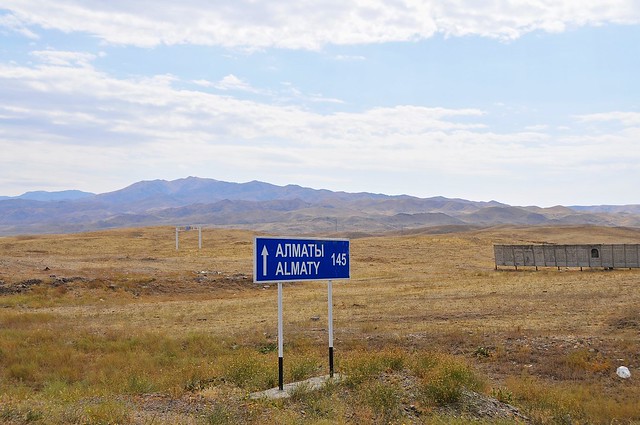 |
| On the road to Almaty. Most of the mountains in Kazakhstan are along the southern borders with Kyrgyzstan, Uzbekistan, and China. |
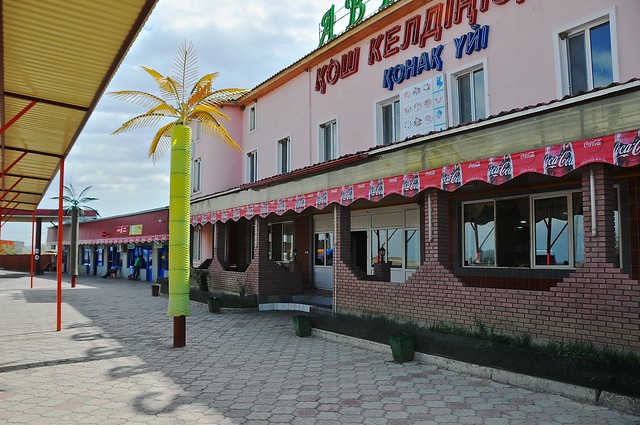 |
| We made a brief stop at this interestingly-decorated restaurant and convenience store. I probably should have bought something here or when I was waiting at the border, just to spend some som and get tenge in change, so I would have some money for bus or taxi fare to get to the hostel. |
As you enter Almaty, it becomes clear that there are real differences between Kazakhstan and Kyrgyzstan: the highway is wide and smooth, there are large and modern shopping malls with 3D movie theaters, the cars are new and undamaged, and things look like they could be from a developed nation.
The Sairan Bus Terminal, where the Marshrutka dropped us off, is well west of the center, and we didn't really have any idea how far away we were. We ended up walking to the Apple Hostel, passing a surprising number of shopping malls along the way. Thankfully, we had been given very specific instructions on how to find the hostel, as it was totally unmarked and in a complex of three apartment buildings, each of which had six separate entrances leading to unconnected stairwells (so you had to get the right entrance), each of which could only be entered by buzzing an apartment. If you didn't know exactly where to go, you'd be lost.
The appropriately named
Apple Hostel—Alma means Apple, and it was known in Russian as Alma Ata, or father of the apple, as this area is regarded as the birthplace of the apple—is basically just an apartment that a couple decided to turn into a hostel. They had their own bedroom—and a cute baby—but the other rooms were converted into dorms and smaller bedrooms. They have a full kitchen, a couple of bathrooms with showers, another without, a laundry machine free for guests to use, free and fast wi-fi (fast internet is very rare in Central Asia), and a couple of laptops you could use. Only the wife spoke English, but she was really helpful and interesting (unfortunately the girl who was there during the daytime didn't speak English) and the guests who stayed there tended to be interesting to talk to, too.
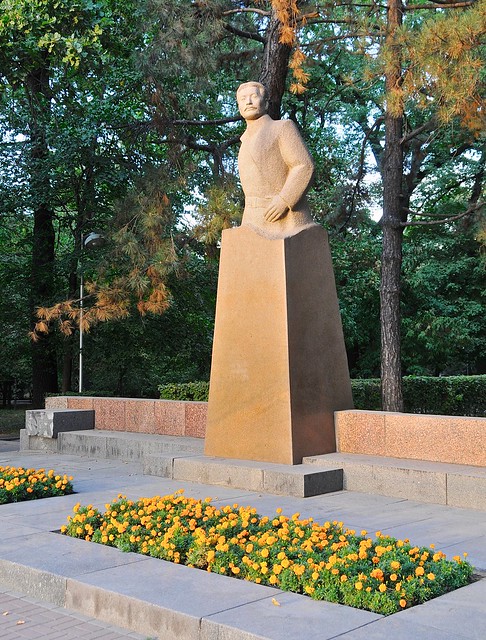 |
| He looks a bit like a Kazakh Stalin. |
On my first full day in Almaty I had a few clear objectives: to buy a train ticket to Astana; to register with the OVIR immigration office; and to visit the Almaty offices of STANtours to pay for my Uzbek letter of invitation (because of the steep bank-wire fees for transfers from North American banks to STANtours's bank, I saved myself almost $50 by making the payment in person—I later learned that
Xoom.com is a pretty cheap way to make transfers from North America.)
The STANtours office is a bit out of the way, but I was able to meet both Katya and David, both of whom are as helpful and nice in person as they are by email. It was a good chance to see what less-touristed parts of the city looked like... and actually it was pretty nice. Apple Hostel is already on the outskirts of the areas tourists are likely to go, just north of the Theater metro station, and as I walked southwest to STANtours I was impressed with the city. Confirming most of what I had seen the evening before, the quiet streets were lined with trees, and there were small shops and markets all over the place. It kind of felt like a peaceful Austrian city, but with a definite Russian flavour.
There was a large shopping mall not far from STANtours, and since I was in need of a second pair pants after my encounter with barbed wire in Ulaanbaatar, I decided to stop by. I had tried to find some between UB and here, but shops with western brands disappeared after Xian, and clothes made for the Chinese market don't fit me very well. In Kazakhstan you have lots of western brands, from Russian-oriented brands to European ones like Zara and Marks & Spencer, to American juggernauts like The Gap. Although there's rarely a day in the US where The Gap isn't on sale, pretty much everything in Kazakhstan was full priced and I didn't relish paying that much. It was still interesting to see places like Burger King in high-end boutiques in Kazakhstan, and to see how much nicer these stores tend to be in places where they are considered relatively high-end stores.
I then headed to the other end of the city, where it was pretty easy to make a train booking for the 20-hour train to Astana leaving the next day. There are a
number of trains each day, and I took one that leaved just after 1:00 in the afternoon and arrived in Astana the next morning at a little after 9:00 am.
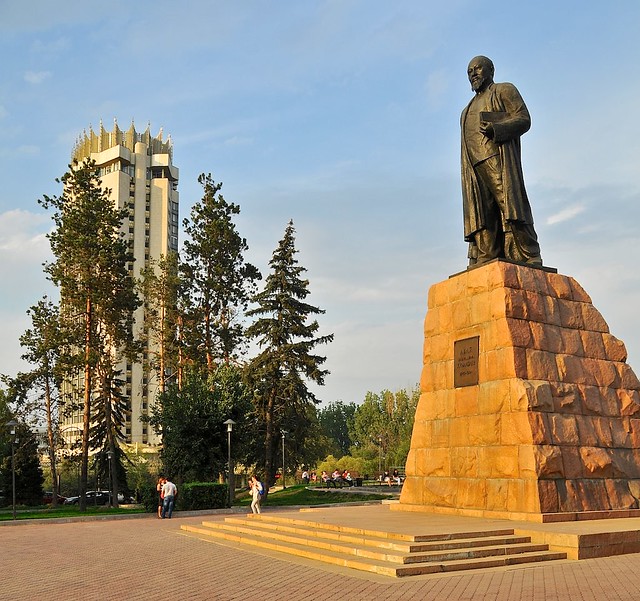 |
| Statue to Kazakh poet Abai Qunanbaiuli, with the well-kept Kazakhstan Hotel. Most Soviet-era buildings in Central Asia look their age, and are little more than peeling, crumbling shells of what they once might have been. Only in prosperous Almaty have these buildings, from the monumental to the pedestrian, been well maintained. |
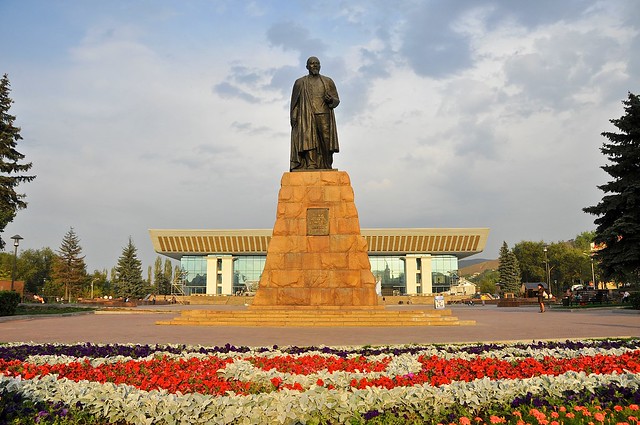 |
| The Palace of the Republic lies behind the statue. The cable-car station for the ride up to Kok Tobe is off to the right. |
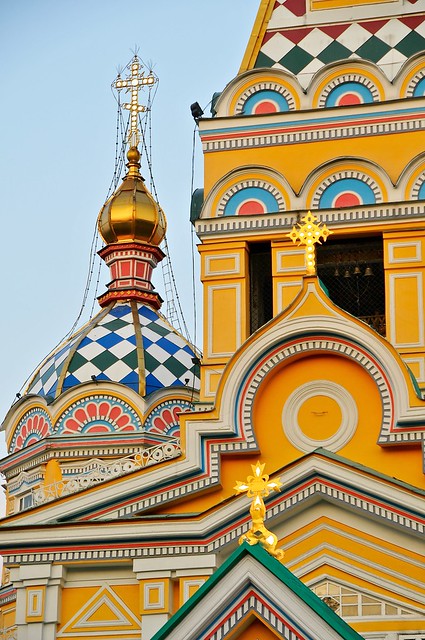 |
| Russian churches really are quite attractive. Like a slightly rusticated, geometric interpretation of Byzantine excess. |
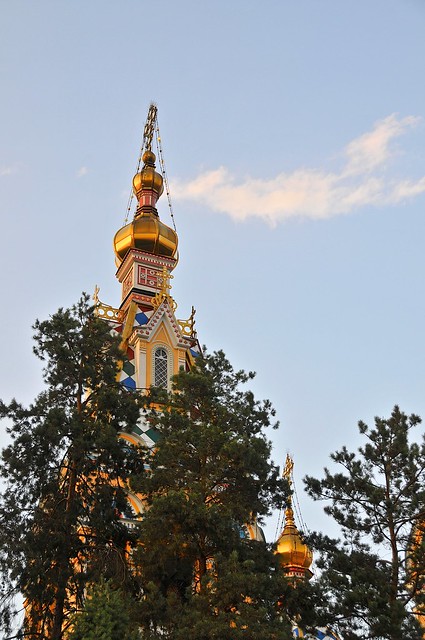 |
| There's something about these pine tree that screams "Russian" to me. In Canada we don't have pine trees like that, or don't use them in parks and landscaping. |
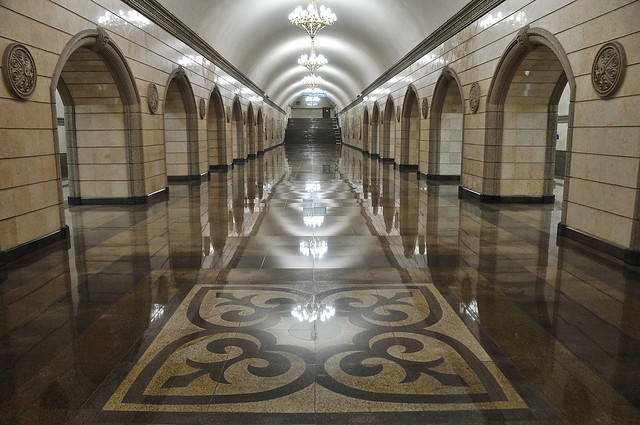 |
| Traditional Kazakh designs adorn the glossy granite floors. |
Unlike the subway system in Tashkent, the
Almaty Metro is a new, post-Soviet project. Well, that's mostly true: at was started in 1988, but stopped pretty quickly with the collapse of the Soviet Union, and work was only started up again after 2003. It was first opened in December 2011, and was thus very new when I was there.
Not a lot of people were riding it, despite the low ticket prices (compared to the high cost of everything else in Almaty), and security was absurdly tight. As the two Germans and I entered the station by the Apple Hostel for our first trip, we were pulled over by a security guard who insisted on seeing our passports. I could probably pass for Kazakh, so it must have been the two Germans who represented the security threat. We got pulled into a security office, where one of the German's wasn't helped by the fact that he had left his passport in the hostel, that we didn't know the name or address of the hostel, or how to get in touch with them. After about fifteen minutes we were released with a warning to have our passports at all times.
Kazakhstan is a little absurd like that. All CIS states are, as a relic of the Soviet era, but some have done a better job of shaking themselves free of such paranoid hostility. One would think that rich, advanced Kazakhstan would be at the forefront of this, but they're really not. I mean, Kazakhstan still has restrictive visa policies (Kyrgyzstan being the most open in that regard, followed probably by Tajikistan, who maintains a visa policy but will immediately grant one to anyone who will pay the fee), and it also maintains the ridiculous policy of requiring all foreigners to
register within 5 days of entering the country (if you leave within 5 days you are OK). Of course the registration process is chaotic, bureaucratic, and unhelpful, with all sorts of requirements supporting a cottage industry of nearby photographers, photocopiers, stenographers, etc. to help applicants complete the requirements. It's also true that if you enter at an airport you are automatically registered and don't have to visit an OVIR office, which means that most people registering are foreign workers that the state really doesn't care that much about. But still.
In many ways, however, it makes some sense that Kazakhstan is still paranoid like that. After all, this is a country that (like many in Central Asia) has had the same leader since the fall of the Soviet Union. Although Nazarbayev is quite popular—a booming economy will do that for you—the best way to maintain an iron-fisted control on power is with, well, an iron fist. In this context, it perhaps unsurprising that Kyrgyzstan is the most politically volatile country in the region, with meaningful elections and five different Presidents since independence (Tajikistan has had one since 1992; Turkmenistan has had two since independence, with change only because the first one died while enjoying the title "President for Life"; and Uzbekistan has had one since independence).
 |
| In typical Soviet style, subway stations are artistic monuments. |
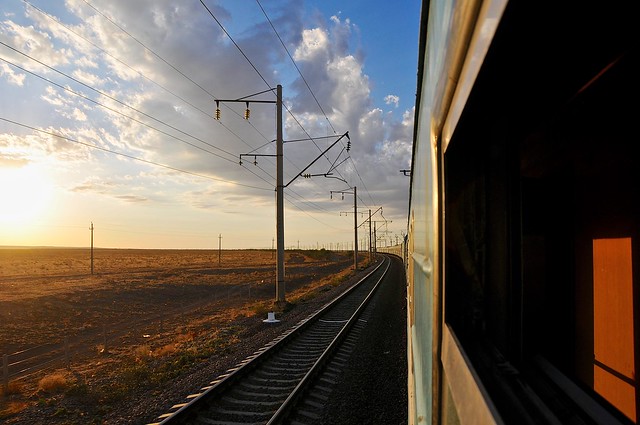 |
| The line to Astana is electrified all along its entire 1,200 km length. |
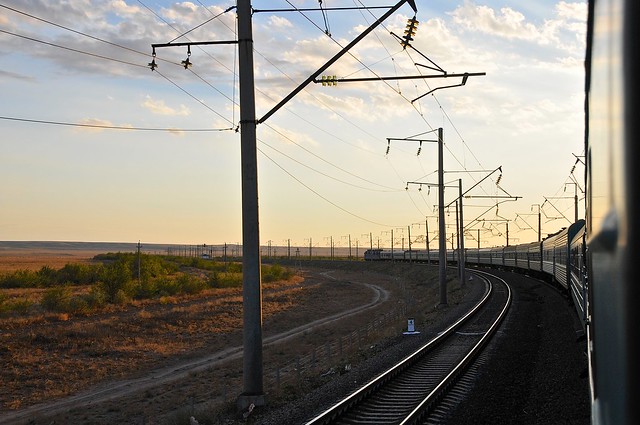 |
| I don't know why there are any curves in the line: most of the route is flat and empty. |
 |
| Platzkartny carriage, with everyone watching a young Kazakh singer on a traditional instrument. In Kazakhstan they don't sell tickets for the upper, un-padded luggage shelf, like they do in Mongolia. |
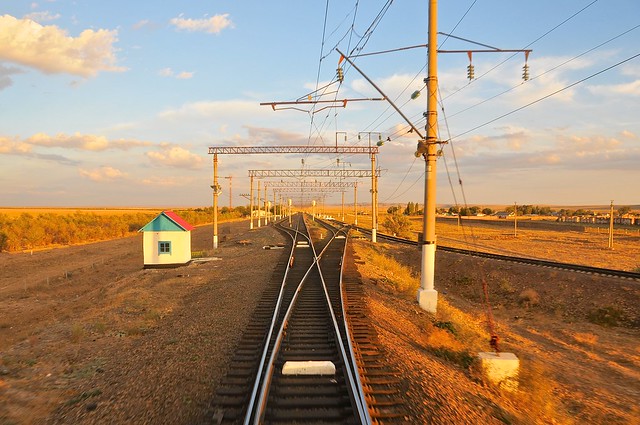 |
| View from the rear of the train. |
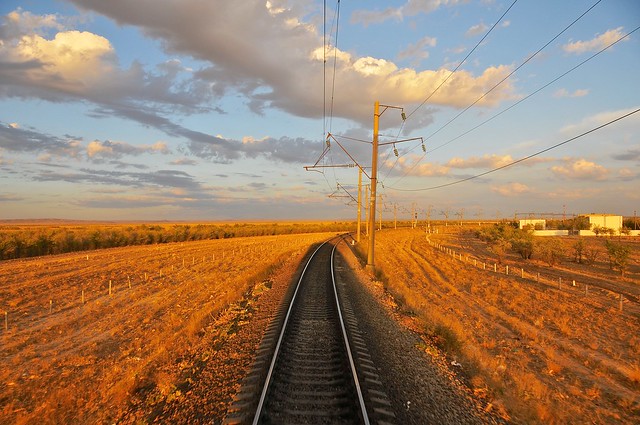 |
| We single-track it most of the way. |
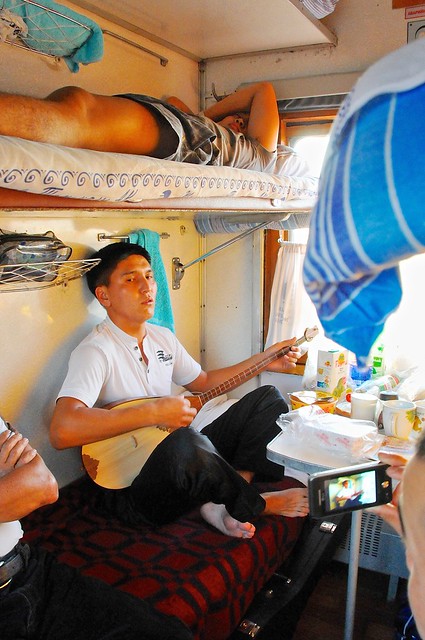 |
| Playing the dombyra and singing folk songs. I tried to swipe on of those blue Kazakh railway towels—the colour of their national flag—on the trip back to Almaty, but the conductors do an inventory. Should have taken one on the way up, where he didn't check. Heck, I would have bought one of those towels, since I love the colour. |
I was on my preferred upper bunk, and I spent much of my time reading on my Kindle. My Kindle had been a bit of a disaster. I bought it just before I started my trip, and had it delivered to my friend in Silicon Valley. When I arrived there, it was dead-on-arrival and wouldn't even start. Amazon over-nighted a replacement that arrived just in time, but even the replacement didn't work properly: it took a long time for pages to refresh (as in, up to 15 seconds), and the refreshes would often leave lots of prior text on the page (so I had to change the setting to force a complete refresh on every page turn). So I wasn't super happy with it, and in the morning we arrived in Astana I ended up leaving it on my bunk and then sitting on it. An audible crack alerted me to the damage I had done, and although the screen felt undamaged there was a crack somewhere and only half the page would refresh. Crap. Amazon ended up replacing the device anyway (I returned it when I arrived home), because they give pretty good service with their Kindles and I also said it wasn't working properly before the screen broke.
Budget
September 12, 2012, from Bishkek to Almaty: 450 som, 5,120 tenge
- Marshrutka to Almaty: 400 som
- Drink: 50 som
- Dorm at Apple Hostel: 2,500 tenge
- Dinner: 2,500 tenge
- Subway x2: 160 tenge
- Fruit, vegetables, sausage, yoghurt, tea: 460 tenge
September 13, Almaty: 10,160
- Letter of invitation for Uzbek visa: 6,040 tenge
- Dorm at Apple Hostel: 2,500 tenge
- Chips, salami, yoghurt: 480 tenge
- 1kg of nectarines: 300 tenge
- Subway & bus: 160 tenge
- Tea and snacks: 680 tenge
September 14, Almaty to Astana: 4,170 tenge
- Train to Astana: 3200 tenge
- Subway: 80 tenge
- Dinner at station: 800 tenge
- Ice tea: 190 tenge
















No comments:
Post a Comment